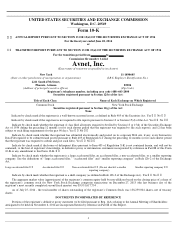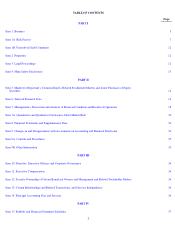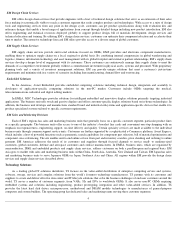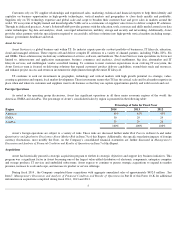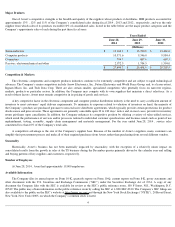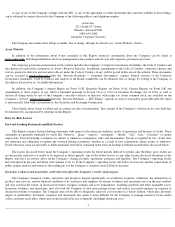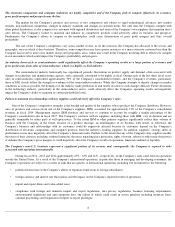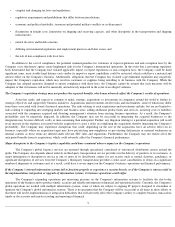Avnet 2014 Annual Report Download - page 12
Download and view the complete annual report
Please find page 12 of the 2014 Avnet annual report below. You can navigate through the pages in the report by either clicking on the pages listed below, or by using the keyword search tool below to find specific information within the annual report.
data. A failure of any of these information systems in a way described above or material difficulties in upgrading these information systems
could have an adverse effect on the Company's business and its compliance with reporting obligations under federal securities laws.
In addition, the Company's information technology may be subject to cybersecurity breaches, computer hacking or other general system
failures. Maintaining and operating these systems requires continuous investments. A security breach could result in sensitive data being lost,
manipulated or exposed to unauthorized persons or to the public. Such a breach may harm the Company’
s reputation and business prospects and
subject the Company to legal claims if there is loss, disclosure or misappropriation of or access to the Company’
s business partners' information.
As threats related to cybersecurity breaches develop and grow, the Company may also find it necessary to make further investments to protect its
data and infrastructure, which may impact the Company’s profitability.
Declines in the value of the Company's inventory or unexpected order cancellations by the Company's customers could adversely affect its
business, results of operations, financial condition and liquidity.
The electronic components and computer products industries are subject to rapid technological change, new and enhanced products,
changes in customer needs and changes in industry standards, which can contribute to a decline in value or obsolescence of inventory.
Regardless of the general economic environment, it is possible that prices will decline due to a decrease in demand or an oversupply of products
and, as a result of the price declines, there may be greater risk of declines in inventory value. Although it is the policy of many of the Company's
suppliers to offer distributors like Avnet certain protections from the loss in value of inventory (such as price protection and limited rights of
return), the Company cannot be assured that such policies will fully compensate for the loss in value, or that the vendors will choose to, or be
able to, honor such agreements, some of which are not documented and, therefore, subject to the discretion of the vendor. In addition, the
majority of the Company's sales are made pursuant to individual purchase orders, rather than through long-
term sales contracts. Where there is a
contract, such contract is generally terminable at will upon notice. The Company cannot be assured that unforeseen new product developments,
declines in the value of the Company's inventory or unforeseen order cancellations by its customers will not adversely affect the Company's
business, results of operations, financial condition or liquidity.
Substantial defaults by the Company's customers on its accounts receivable or the loss of significant customers could have a significant
negative impact on the Company's business, results of operations, financial condition or liquidity.
A significant portion of the Company's working capital consists of accounts receivable from customers. If customers responsible for a
significant amount of accounts receivable were to cease doing business, direct their business elsewhere, become insolvent or otherwise unable to
pay the amount they owe the Company, or were to become unwilling or unable to make such payments in a timely manner, the Company's
business, results of operations, financial condition or liquidity could be adversely affected. An economic or industry downturn could adversely
affect the collectability of these accounts receivable, which could result in longer payment cycles, increased collection costs and defaults in
excess of management's expectations. A significant deterioration in the Company's ability to collect on accounts receivable could also impact the
cost or availability of financing under its accounts receivable securitization program (see Financing Transactions
appearing in Item 7 of this
Report).
The Company may not have adequate or cost-effective liquidity or capital resources.
The Company's ability to satisfy its cash needs and implement its capital allocation strategy depends on its ability to generate cash from
operations and to access the financial markets, both of which are subject to general economic, financial, competitive, legislative, regulatory and
other factors that are beyond the Company's control.
The Company may need to satisfy its cash needs through external financing. However, external financing may not be available on
acceptable terms or at all. As of June 28, 2014
, Avnet had total debt outstanding of approximately $2.1 billion under various notes, secured
borrowings and committed and uncommitted lines of credit with financial institutions. The Company needs cash to make interest payments on,
and to repay, this indebtedness and for general corporate purposes, such as funding its ongoing working capital and capital expenditure needs.
Under the terms of any external financing, the Company may incur higher than expected financing expenses and become subject to additional
restrictions and covenants. Any material increase in the Company's financing costs could have a material adverse effect on its profitability.
Under certain of its credit facilities, the Company is required to maintain certain specified financial ratios and meet certain tests. If the
Company fails to meet these financial ratios and/or tests, it may be unable to continue to utilize these facilities. If the Company is unable to
utilize these facilities, it may not have sufficient cash available to make interest payments on and repay indebtedness and for general corporate
needs. General economic or business conditions, domestic and foreign, may be less favorable than management expects and could adversely
impact the Company's sales or its ability to collect receivables from its customers, which may impact access to the Company's securitization
program.
10


